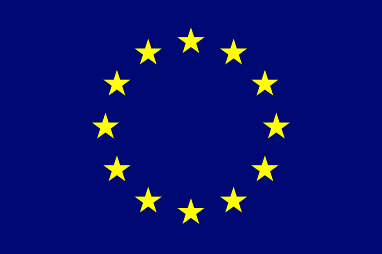Publications
Throughout the year, VOICE produces and disseminates key documents reflecting on humanitarian aid issues at the EU level and from an NGO perspective. They are addressed to decision-makers within the European institutions, at the National level, to NGO networks and other stakeholders of the humanitarian community, as well as to the VOICE members. Some documents are produced by the VOICE Secretariat with the support of VOICE members while others are publications from members and other key stakeholders in the humanitarian sector.
Please note that members-only documents will not be visible unless you are logged in.
-
'Post COVID-19: EU humanitarian aid in the next Multiannual Financial Framework' - VOICE Policy Resolution 2020
25 May 2020VOICE policy resolutionsIn the policy resolution 2020, VOICE calls on the EU to timely adopt a new MFF that goes well beyond being a COVID-19 response and that effectively supports people affected by humanitarian crises around the world. -
Risk-informed approaches to humanitarian funding: Using risk finance tools to strengthen resilience
18 May 2020ECHO commissioned this study to explore the role that pre-arranged financing can plan in reducing or mitigating disaster impacts by supporting anticipatory action and response. The study terms of reference state the objective is: “to assist DG ECHO in developing approaches to mainstreaming risk-based financing and specific risk financing tools for reducing the impact of disasters, decreasing overall ex-post humanitarian funding and enhancing preparedness”. -
-

COVID- 19 Webinar: Video message from VOICE Director
28 April 2020WEBINAR: European response to the impact of the COVID-19 crisis on the delivery of humanitarian aid. Unfortunately, technical issues prevented VOICE Director Kathrin Schick to participate directly in the webinar. Her video intervention has been recorded afterward. Please click here to watch it! -
World Vision Report - COVID-19 Aftershocks: Secondary Impacts Threaten more Children's Lives than Disease Itself
24 April 2020Members' publicationsToo many children, especially those living in fragile contexts, already face unacceptable threats to their wellbeing and futures. World Vision’s experience in Ebola has shown us that beyond COVID-19 itself, children will inevitably face heightened food insecurity; increased risk of violence, neglect, abuse and exploitation; and the interruption or total breakdown of essential services including formal and informal education. While
children may not suffer the worst symptoms of COVID-19, millions of young lives will be put at risk as weak health systems become overwhelmed by the pandemic and precious resources are diverted. -
COVID-19 and humanitarian action: VOICE key messages
22 April 2020Key messages developed by VOICE regarding the humanitarian aid challenges brought by the current pandemic addressed to donors and governments. -
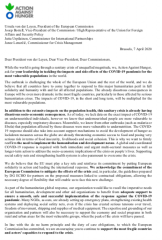
Action Against Hunger: Letter on the EU's Response to COVID-19
20 April 2020Members' publicationsA letter from Action Against Hunger to the EU and its response to COVID-19 -
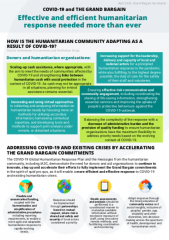
COVID-19 and the Grand Bargain: Effective and efficient humanitarian response needed more than ever
15 April 2020A 1-pager providing an overview of adaptations of the humanitarian response, and further steps needed to enable a more efficient and effective response to COVID-19 and existing humanitarian crises. -
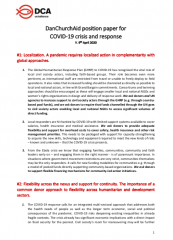
DanChurchAid position paper for COVID-19 crisis and response
14 April 2020Members' publicationsPosition Paper of DanChurchAid for the response of the COVID-19 crisis. -
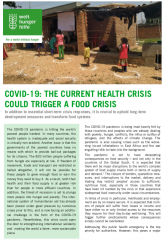
Welthungerhilfe: COVID-19: The Current Health Crisis Could Trigger a Food Crisis
14 April 2020Members' publicationsPublication by Welthungerhilfe on COVID-19: The Current Health Crisis could trigger a Food Crisis. -
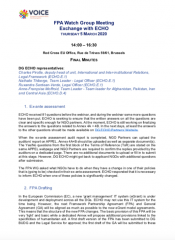
FPA Watch Group 05/03/2020 - Exchange with ECHO
27 March 2020FPA Watch GroupMinutes from the exchange between ECHO and the FPA Watch Group on March 5, 2020. -
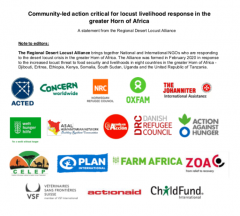
Community-led action critical for locust livelihood response in the greater Horn of Africa
24 March 2020Members' publicationsA statement from the Regional Desert Locust Alliance.
While the attention of the global community is drawn to COVID-19, the unprecedented desert locust invasion across the Greater Horn of Africa remains an added threat to food security and livelihoods in ten countries. It is critical that activities to control locusts and address their impact on livelihoods continue, with local communities placed at the forefront. -
NRC’s Practical Guide for Project Cycle Management and Counterterrorism Risks
24 March 2020Members' publicationsThis practical guide outlines the origin and impact of counterterrorism measures and proposes actions for humanitarian organizations to consider throughout the project management cycle to help manage and mitigate counterterrorism-related risks. -
EU humanitarian aid matters more than ever
16 March 2020VOICE studies and briefing papersA briefing outlining the importance of EU humanitarian aid implemented by NGOs that are in a unique position to respond to the most vulnerable. -
Multi-year humanitarian funding: Global baselines and trends - Development Initiatives
11 March 2020A comprehensive breakdown of multi-year humanitarian funding, looking at long-term trends in donors, recipients and earmarking. Are Grand Bargain recommendations being met? -
Charter for Change 2019 Annual Meeting
26 February 2020From 10-11 December 2019, 31 national NGOs from crisis-affected contexts and 25 international NGOs met for the Charter4Change 2019 Annual Meeting in Copenhagen to take stock on progress and share good practices amongst the Charter4Change signatories and endorsers in promoting localisation efforts.
The C4C annual meeting was co-hosted by DanChurchAid, CARE Denmark, Caritas and Oxfam IBIS. -
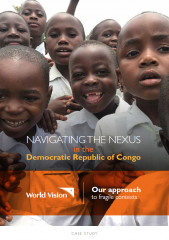
Navigating the nexus in the Democratic Republic of the Congo - World Vision
21 February 2020Members' publicationsBased on extensive experience in the Democratic Republic of Congo (DRC), and specifically in Rutshuru in the east, World Vision has accumulated lessons learned and recommendations around how agencies can sustainably programme across the humanitarian-development-peacebuilding nexus in an integrated way in fragile contexts. The aim of this work is to enable communities to survive, adapt to challenging situations, and thrive, while at the same time ensuring World Vision and others respond quickly and safely in environments that are inherently volatile. -
Suffering in Silence - The 10 most under-reported humanitarian crises of 2019- Care International
31 January 2020Members' publicationsThrough the analysis of global online media coverage, CARE identified the top 10 crises that received little to no media attention in 2019. The African continent hosts nine out of ten underreported crises, which are : Madagascar, Central African Republic, Zambia, Burundi, Eritrea, DPR Korea, Kenya, Burkina Faso, Ethiopia, Lake Chad Basin. With this report, CARE aims at challenging aid organizations and policymakers to make conscious choices about their priorities. For most of the underreported crises in this Top 10 list, the humanitarian response is also chronically underfunded. -
VOICE FPA Briefing. Partners in Humanitarian Aid: The development of the ECHO-NGO relationship as governed by the Framework Partnership Agreement
13 January 2020VOICE studies and briefing papersVOICE has produced this briefing to take stock of the evolving NGO-ECHO partnership – enshrined with the signing of the Framework Partnership Agreement (FPA) – serving as an update of a previous VOICE publication on the topic from 2004. The briefing is based upon a desk review and a series of semi-structured interviews with former and current members of the FPA Watch Group, ECHO officials, and staff from the VOICE Secretariat. The interviews were carried out either in 2004 (for the initial version) or in 2017 and 2018 (for the updated version). Interviewees were selected so as to ensure a broad range of backgrounds and experiences (different geographic regions, areas of involvement and areas of expertise) in terms of the FPA process, ECHO-NGO relations, and the Watch Group and Task Force. -
IRC Emergency Watchlist 2020
08 January 2020Members' publicationsWatchlist 2020 highlights the countries where the IRC assesses there to be the greatest risk of a major deterioration in the humanitarian situation in the coming year.
The countries on Watchlist 2020 have changed little since last year, underscoring both the protracted nature of many of these crises and collec-tive failure of the international community to resolve their root causes. In many cases, constraints on humanitarian access contribute to the already precarious conditions of Watchlist 2020 countries. -
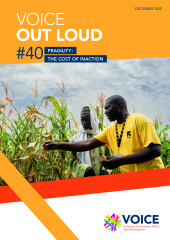
-
WeWorld-GVC Nexus Collection
30 December 2019Members' publicationsWeWorld-GVC did a colleciton of four publications on the nexus:
Nexus Collection Vol.1 – From Humanitarian to Development. Ensure protection in complex crisis
Nexus Collection Vol.2 – Ensuring Humanitarian Development Connectedness: Collective Outcomes, What Does It Mean?
Nexus Collection Vol.3 – The Humanitarian-Development Nexus. A Collective Responsibility
Nexus Collection Vol.4 – Operationalizing the Humanitarian-Development Nexus in the oPt. Lesson from the Ground -
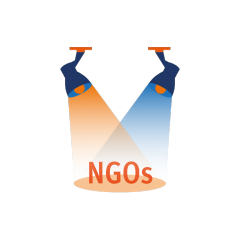
Partners' Conference 2019 - Speech of VOICE President - Dominic Crowley
12 December 2019The speech of VOICE President Dominic Crowley at the ECHO Partners Conference 2019 -
Joint letter from NGO networks to the European Heads of States - next Multiannual Financial Framework (MFF) - Heading VI
11 December 2019A joint letter co-signed by VOICE, CAN, CONCORD, Eurodad, ENoP, EPLO and HRDN sent to EU Head of States in advance of the European Council on 12-13 December 2019 to present recommendations on Heading VI of the next Multiannual Financial Framework (MFF) 2021-2027. -
Country-based pooled funds: The NGO perspective
06 December 2019Members' publicationsMore than 1,000 non-governmental organisations have worked in partnership with the UN Office for the Coordination of Humanitarian Affairs to implement the vast majority of funding channelled through country-based pooled funds. This study brings together their experiences and recommendations to improve a mechanism that has become a staple of the humanitarian landscape and financing toolbox.

